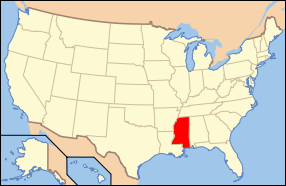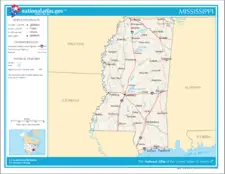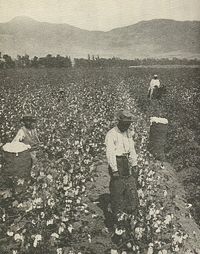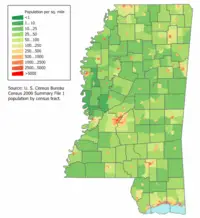Mississippi
| State of Mississippi | |||||||||||
| |||||||||||
| Official language(s) | English | ||||||||||
| Capital | Jackson | ||||||||||
| Largest city | capital | ||||||||||
| Area | Ranked 32nd | ||||||||||
| - Total | 48,430 sq mi (125,443 km²) | ||||||||||
| - Width | 170 miles (275 km) | ||||||||||
| - Length | 340 miles (545 km) | ||||||||||
| - % water | 3% | ||||||||||
| - Latitude | 30° 12′ N to 35° N | ||||||||||
| - Longitude | 88° 06′ W to 91° 39′ W | ||||||||||
| Population | Ranked 31st in the U.S. | ||||||||||
| - Total | 2,978,512 (2011 est)[1] | ||||||||||
| - Density | 63.5/sq mi (24.5/km2) Ranked 32nd in the U.S. | ||||||||||
| - Median income | $36,338[2] (50th) | ||||||||||
| Elevation | |||||||||||
| - Highest point | Woodall Mountain[3][4] 807 ft (246.0 m) | ||||||||||
| - Mean | 300 ft (90 m) | ||||||||||
| - Lowest point | Gulf of Mexico[3] 0 ft (0 m) | ||||||||||
| Admission to Union | December 10, 1817 (20th) | ||||||||||
| Governor | Phil Bryant (R) | ||||||||||
| Lieutenant Governor | Tate Reeves (R) | ||||||||||
| U.S. Senators | Thad Cochran (R) Roger Wicker (R) | ||||||||||
| Time zone | Central: UTC-6/-5 | ||||||||||
| Abbreviations | MS Miss. US-MS | ||||||||||
| Web site | www.mississippi.gov | ||||||||||
Mississippi is a state located in the Deep South of the United States. Jackson is the state capital and largest city. The state's name comes from the Mississippi River, which flows along its western boundary, and takes its name from the Ojibwe word misi-ziibi ("Great River"). The state is heavily forested outside of the Mississippi Delta area.
Before the American Civil War, Mississippi was the fifth-wealthiest state in the nation, based largely on the value of slaves, who were counted as property then. High prices for cotton, the primary crop, added to its wealth. Yet the state was slow to use its largess to invest in infrastructure such as roads, railroads, and public schools. Industrialization did not come in many areas until the late twentieth century. Following the Civil War, Mississippi became one of the poorest states. Lacking opportunity at home, tens of thousands of people, especially African Americans, migrated to industrialized cities.
The hardships of the state's slave population before to the Civil War and the Reconstruction gave birth to Mississippi's present-day cultural and artistic heritage. It is rich in folklore, dance, soulful music, and pride in their forebears' creative means of survival.
Geography
Mississippi is bordered on the north by Tennessee, on the east by Alabama, on the south by Louisiana and a narrow coast on the Gulf of Mexico, and on the west, across the Mississippi River, by Louisiana and Arkansas.
The state of Mississippi is entirely composed of lowlands, the highest point being Woodall Mountain, only 806 feet (246 m) above sea level. The mean elevation in the state is 300 feet (91 m) above sea level.
Most of Mississippi is part of the East Gulf Coastal Plain, which is generally composed of low hills. The northeast is a region of fertile black earth that extends into Alabama.
The coastline includes large bays at Bay St. Louis, Biloxi, and Pascagoula. It is separated from the Gulf of Mexico proper by the shallow Mississippi Sound, which is partially sheltered by several islands.
The northwest remainder of the state is made up of a section of the Mississippi Alluvial Plain, also known as the Mississippi Delta, which is narrow in the south and widens north of Vicksburg. The region has rich soil, partly made up of silt that had been regularly deposited by the floodwaters of the Mississippi River.
Climate

Mississippi has a humid subtropical climate with long summers and short, mild winters. The temperature varies little statewide in the summer, but in winter the region near Mississippi Sound is significantly warmer than inland. Yearly precipitation generally increases from north to south. Small amounts of snow fall in northern and central Mississippi, although snow is not unheard of around the southern part of the state.
The late summer and fall is the seasonal period of risk for hurricanes moving inland from the Gulf of Mexico, especially in the southern part of the state. Hurricane Camille in 1969 and Hurricane Katrina in 2005, which killed 238 people in the state, have been the most devastating hurricanes to hit the state, both causing nearly total storm surge damage around Gulfport, Biloxi, and Pascagoula. As in the rest of the Deep South, thunderstorms are common, especially in the southern part of the state. On average, Mississippi has around 27 tornadoes annually. Two of the five deadliest tornadoes in U.S. history have occurred in the state. These storms struck Natchez, in southwest Mississippi, and Tupelo, in the northeast.
Ecology
Mississippi is heavily forested, with over half of the state's area covered by wild trees; mostly pine, but also cottonwood, elm, hickory, oak, pecan, sweetgum, and tupelo. Lumber is a prevalent industry in Mississippi.
Due to seasonal flooding possible from December to June, the Mississippi River created a fertile floodplain in what is called the Mississippi Delta, including tributaries. This flooding has taken a toll over the years. Despite repeated efforts to raise the height of levees, the region was severely flooded and suffered millions of dollars in damages due to the Great Mississippi Flood of 1927. Property, stock, and crops were all lost.[5]
History

In approximately 9500 B.C.E., Native American or Paleo-Indians appeared in what today is referred to as the U.S. South.[6]
Paleoindians in the region were hunter-gatherers who pursued the megafauna that became extinct following the end of the Pleistocene age. After thousands of years, the Paleoindians developed a rich and complex agricultural society. Archaeologists called these people the Mississippians of the Mississippian culture; they were mound builders, whose large earthworks related to political and religious rituals still stand throughout the Mississippi and Ohio valleys. Descendant Native American tribes include the Chickasaw and Choctaw. Other tribes that inhabited the territory of Mississippi include the Natchez, the Yazoo, and the Biloxi.
Arrival of Europeans
The first major European expedition into the territory that became Mississippi was that of Hernando de Soto, who passed through in 1540. The first European settlement was French, Fort Maurepas (also known as Old Biloxi), which was settled in 1699. In 1716, Natchez was founded on the Mississippi River (as Fort Rosalie); it became the dominant town and trading post of the area. After being ruled by Spanish, British, and French colonial governments, the Mississippi area was deeded to the British after the French and Indian War under the terms of the Treaty of Paris (1763). After the American Revolution, it became part of the new United States of America.
The Mississippi territory was organized in 1798 from territory ceded by Georgia and South Carolina. It was later twice expanded to include disputed territory claimed by both the United States and Spain. The U.S. purchased land (generally through unequal treaties) from Native American tribes from 1800 to about 1830.
Nineteenth century
On December 10, 1817, Mississippi was the 20th state admitted to the Union.
When cotton was king during the 1850s, Mississippi plantation owners—especially those of the Delta and Black Belt regions—became wealthy due to the high fertility of the soil, the high price of cotton on the international market, and their assets in slaves. The planters' dependence on hundreds of thousands of slaves for labor, and the severe wealth imbalances among whites, played strong roles both in state politics and in planters' support for secession. By 1860, the enslaved population numbered 436,631, or 55 percent of the state's total of 791,305. There were fewer than one thousand free people of color. [7] The relatively low population of the state before the Civil War reflected the fact that much of the state away from the riverfronts was still wilderness.
Mississippi was the second state to secede from the Union as one of the Confederate States of America on January 9, 1861. Under the terms of Reconstruction, Mississippi was readmitted to the Union on February 23, 1870.
While Mississippi typified the Deep South in passing Jim Crow laws in the early twentieth century, its history was more complex. Because the Mississippi Delta contained so much fertile bottomland that had not been developed before the Civil War, 90 percent of the land was still frontier. After the Civil War, tens of thousands of migrants were attracted to the area. They could earn money by clearing the land and selling timber, and eventually advance to ownership. The new farmers included freed-men, who achieved unusually high rates of land ownership in the Mississippi bottomlands. In the 1870s and 1880s, many black farmers succeeded in gaining ownership of land through this method.[8]
By the turn of the century, two-thirds of the farmers in Mississippi who owned land in the Delta were African-American. Many were able to keep going through difficult years of falling cotton prices only by extending their debts. Cotton prices fell throughout the decades following the Civil War. As another agricultural depression lowered cotton prices in the 1890s, however, numerous African-American farmers finally had to sell their land to pay off debts, and thus lost the land into which they had put so much labor. By 1910, the majority of blacks in the Delta were landless laborers.[8]
White legislators created a new constitution in 1890, with provisions that effectively disfranchised most blacks and many poor whites. Estimates are that 100,000 blacks and 50,000 whites were removed from voter registration rolls over the next few years.[9] The loss of political influence contributed to the difficulties of African Americans getting extended credit. Together with Jim Crow laws, increased lynchings in the 1890s, failure of the cotton crops due to boll weevil infestation, successive severe flooding in 1912 and 1913 created crisis conditions for many African Americans. With control of the ballot box and more access to credit, white planters expanded their ownership of Delta bottomlands and could take advantage of new railroads.
Twentieth century
By 1910, a majority of black farmers in the Delta had lost their land and were sharecroppers. By 1920, the third generation after freedom, most African-Americans in Mississippi were landless laborers again facing poverty.[8] Starting about 1913, tens of thousands of African Americans left Mississippi to migrate North in the Great Migration to industrial cities such as New York, Chicago, Detroit, Philadelphia, and St. Louis, seeking jobs, better education for their children, the right to vote, and better living conditions. In the migration of 1910-1940, they left a society that had been steadily closing off opportunity. Most migrants from Mississippi took trains directly north to Chicago and often settled near former neighbors.
The Second Great Migration from the South began in the 1940s and lasted until 1970. Almost half a million people left Mississippi in the second migration, three-quarters of them black. Nationwide during the first half of the twentieth century, African Americans became rapidly urbanized and many worked in industrial jobs.
Mississippi generated rich, quintessentially American music traditions: gospel music, country music, jazz, blues, and rock and roll. All were invented, promulgated, or heavily developed by Mississippi musicians, and most came from the Mississippi Delta. Many musicians carried their music north to Chicago, where they made it the heart of that city's jazz and blues.
Civil rights

Mississippi was a center of activity to educate and register voters during the Civil Rights Movement. Although 42 percent of the state's population was African American in 1960, discriminatory voter registration processes still prevented most of them from voting. These provisions had been in place since 1890.[7] Students and community organizers from across the country came to help register voters and establish Freedom Schools. Resistance and harsh attitudes of many white politicians (including the creation of the Mississippi State Sovereignty Commission), the participation of Mississippians in the White Citizens' Councils, and the violent tactics of the Ku Klux Klan and its sympathizers, gained Mississippi a reputation in the 1960s as a reactionary state.[10][11]
In 1966, Mississippi was the last state to repeal prohibition of alcohol. In 1995, it symbolically ratified the Thirteenth Amendment, which had abolished slavery. While the state was late in ratifying the amendments, it obeyed them.
On August 17, 1969, Category 5 Hurricane Camille hit the Mississippi coast, killing 248 people and causing $1.5 billion in damage (1969 dollars). On August 29, 2005, Hurricane Katrina, though a Category 3 storm upon final landfall, caused even greater destruction across the entire 90 miles (145 km) of Mississippi Gulf Coast from Louisiana to Alabama.
Economy
The Bureau of Economic Analysis[12] estimates that Mississippi's total state product in 2006 was $84 billion. Per capita personal income in 2006 was only $26,908, the lowest per capita personal income of any state, but the state also had the nation's lowest living costs. Although the state has one of the lowest per capita income rates in the United States, Mississippians consistently rank as one of the highest per capita in charitable contributions.[13]
Mississippi's rank as one of the poorest states is related to its dependence on cotton agriculture before and after the Civil War, late development of its frontier bottomlands in the Mississippi Delta, repeated disastrous flooding in the late nineteenth and early twentieth centuries requiring massive capital investment in levees, heavy capital investment to ditch and drain the bottomlands, and slow development of railroads to link bottomland towns and river cities.[14] The 1890 constitution discouraged industry, a legacy that would slow the state's progress for years.
The state refused for years to build human capital by fully educating all its citizens. In addition, the reliance on agriculture grew increasingly costly as the state suffered loss of crops due to the devastation of the boll weevil in the early twentieth century, devastating floods in 1912-1913 and 1927, the collapse of cotton prices after 1920, and drought in 1930.[14]

Despite the state's building and reinforcing levees for years, the Great Mississippi Flood of 1927 broke through and caused massive flooding of 27,000 square miles (70,000 km²) throughout the Delta and millions of dollars in property damages. With the Great Depression coming so soon after the flood, the state suffered badly during those years. Tens of thousands of people migrated north for jobs and chances to live as full citizens.
The legislature's 1990 decision to legalize casino gambling along the Mississippi River and the Gulf Coast has led to economic gains for the state. An estimated $500,000 per day in tax revenue was lost following Hurricane Katrina's severe damage to several coastal casinos in August 2005. Before Hurricane Katrina struck the Gulf Coast, Mississippi was the second largest gambling state in the Union, after Nevada and ahead of New Jersey.
On August 30, 2007, a report by the United States Census Bureau indicated that Mississippi was the poorest state in the country. Many white cotton farmers in the Delta have large, mechanized plantations, some of which receive extensive federal subsidies, yet many African Americans still live as poor, rural, landless laborers. Of $1.2 billion from 2002-2005 in federal subsidies to farmers in the Bolivar County area of the Delta, only 5 percent went to small farmers. There has been little money apportioned for rural development. Small towns are struggling. More than 100,000 people, mostly African American, have left the region in search of work elsewhere. [15]
Law and government
Executive authority in the state rests with the governor; the lieutenant governor is elected on a separate ballot. Both the governor and lieutenant governor are elected to four-year terms of office. Unlike the federal government, but like many other U.S. states, most of the heads of major executive departments are elected by the citizens of Mississippi rather than appointed by the governor.
Mississippi is one of only five states that elects its state officials in odd numbered years (The others are Kentucky, Louisiana, New Jersey, and Virginia). Mississippi holds elections for these offices every four years in the years preceding presidential election years.
Legislative authority resides in the state legislature, composed of the Senate and House of Representatives. Current state law sets the number of senators at 52 and representatives at 122. The term of office for senators and representatives is four years.
Supreme judicial authority rests with the state Supreme Court, which has statewide authority. In addition, there is a statewide Court of Appeals, as well as Circuit Courts, Chancery Courts and Justice Courts, which have more limited geographical jurisdiction.
Mississippi has two U.S. Senate seats. As of the 2001 apportionment, the state has four congressmen in the U.S. House of Representatives.
Politics
Federal politics
Mississippi, like the rest of the South, long supported the Democratic Party. The policies of Reconstruction, which included federally appointed Republican governors, led to white Southern resentment toward the Republican Party. After federal troops enforcing the provisions of Reconstruction were pulled out of the South, the Democratic Party regained political control of the state, partly by using methods designed to suppress black voter turnout, which had understandably favored Republican candidates.
In 1890, the elite white-dominated Mississippi legislature created a new constitution, the first in the South of what were called disfranchising constitutions. They contained provisions, such as poll taxes and literacy tests, that in practice effectively disfranchised most blacks and many poor whites. These laws continued to be enforced for decades.
During the fall of 1963, civil rights activists quickly registered 80,000 black voters in Mississippi for the straw Freedom Vote, to demonstrate the people's ambition and eagerness to vote. In 1964, the Mississippi Freedom Democratic Party (MFDP) was formed, creating a list of candidates to challenge the official, all-white slate of the state's Democratic Party. The MFDP also mounted protests at the national convention, where they demanded to be seated as official delegates. Not until the late 1960s, following passage of the federal Voting Rights Act of 1965 would most African-Americans have the chance to vote in Mississippi and other Southern states.
For 116 years (from 1876 to 1992), Mississippi was essentially a one-party state, electing Democratic governors. Over the same period, the Democratic Party dominated state and federal elections in Mississippi. Until the late 1960s, the party was essentially all white. The enfranchisement of African Americans after passage of the Voting Rights Act happened with the support of the national Democratic Party, and most blacks joined the Democratic Party at the state level.
Since the 1960s, the Republican Party has become competitive in statewide elections. Many conservative white Democrats have switched parties, or at least become willing to support Republicans in national contests. In 1964, Barry Goldwater took an unheard-of 87 percent of the state's popular vote (before most African Americans could vote.) Since then, Mississippi has supported a Democrat for president only once, in 1976, when Jimmy Carter narrowly carried the state by two percentage points.[16]
State politics
Mississippi has 82 counties. Citizens of Mississippi counties elect the members of their county Board of Supervisors from single-member districts, as well as other county officials.
On some social issues, Mississippi is one of the more conservative states in the U.S., with religion often playing a large role in citizens' political views. Liquor laws are particularly strict and variable from jurisdiction to jurisdiction. Liquor sales are frequently banned on Sunday. Many cities and counties allow no alcoholic beverage sales ("dry"), while others allow beer but not liquor, or liquor but not beer. Some allow beer sales, but only if it is not refrigerated.
In 2001, Mississippi banned adoption by same-sex couples and banned recognition of adoptions by same-sex couples which were done and recognized in other states or countries. In 2004, 86 percent of voter turnout amended the state constitution to ban same-sex marriage and ban state recognition of same-sex marriages that were done and recognized in other states and countries.
At the same time, Mississippi has been one of the more innovative states in the country, having been the first state to implement a sales tax and the first state to pass a Married Women's Property Act. Also, Mississippi has elected more African-American officials than any other state in the United States. Mississippi is one of only a few states to have decriminalized the possession of marijuana, so that possession of 30 grams or less of marijuana is punishable only by a fine of $100 - $250 for the first offense with no jail time.[17]
Demographics and culture
The 2000 census reported Mississippi's population as 2,844,658. As of 2011, Mississippi had an estimated population of 2,978,512.[1] Mississippi's population has the largest proportion of African-Americans of any U.S. state, currently nearly 37 percent.
Until the 1930s, African Americans made up a majority of Mississippians. Due to the Great Migration, when more than 360,000 African Americans left the state during the 1940s and after for better economic opportunities in the northern and western states, Mississippi's African-American population declined. The state has the highest proportion of African Americans in the nation. Recently, the African-American percentage of population has begun to increase due mainly to a higher birth rate than the state average. Due to patterns of settlement, in many of Mississippi's public school districts, a majority of students are of African descent. African Americans are the majority ethnic group in the northwestern Yazoo Delta, the southwestern, and the central parts of the state, chiefly areas where the group owned land as farmers or worked on cotton plantations and farms. More than 98 percent of the white population of Mississippi is native born, predominantly of British and Celtic descent.
People of French Creole ancestry form the largest demographic group in Hancock County on the Gulf Coast. The African-American; Choctaw, mostly in Neshoba County; and Chinese-American segments of the population are also almost entirely native born.
Although some ethnic Chinese were recruited as indentured laborers from Cuba during the 1870s and later, the majority immigrated directly from China to Mississippi between 1910 and 1930. While planters first made arrangements with the Chinese for sharecropping, most Chinese soon left that work. Many became small merchants and especially grocers in towns throughout the Delta.[18]
According to recent statistics, Mississippi leads the country in the rate of increase of immigrants, but that is compared to years when it attracted no immigrants.
The largest religious denominations by number of adherents in 2000 were the Southern Baptist Convention with 916,440; the United Methodist Church with 240,576; and the Roman Catholic Church with 115,760. [19]
Mississippi's education system ranks lowest in the country in academic achievement, with the lowest average ACT scores and spending per pupil in the nation.
Musicians of the state's Delta region were historically significant to the development of the Blues. Their laments arose out of the region's hard times after Reconstruction. Although by the end of the nineteenth century, two-thirds of the farm owners were black, continued low prices for cotton and national financial pressures resulted in most of them losing their land. More problems built up with the boll weevil infestation, when thousands of agricultural jobs were lost. The most famous Mississippi blues artist is B. B. King. Many Mississippi musicians migrated to Chicago and created new forms of jazz and other genres there. Mississippi has also been fundamental to the development of American music has a whole. Elvis Presley, who created a sensation in the 1950s as a crossover artist and contributed to rock 'n' roll, was a native of Tupelo. From opera star Leontyne Price to the alternative rock band 3 Doors Down, to gulf and western singer Jimmy Buffett, to rappers David Banner and Afroman, Mississippi musicians have been significant in all genres.
Looking to the future
The U.S. Census Bureau determined in 2007 that Mississippi was the poorest state in the country, and its public school system has been ranked at the bottom of almost all measurable standards for many years. Relying on its cotton industry for decades, the state failed to invest in more diversified development. The foresight that was lacking in the state's economic sector was also lacking in regards to its environment; farming and hunting without regulation reduced its once abundant wildlife to near extinction, though some of it is being restored.
More than half of Mississippi's land area is forested, with much of it commercially based, providing lumber, paper pulp, and other forest products. The bald cypress, once thought to be extinct in Mississippi, has been found and is now being protected as a wildlife management area. Its Gulf Coast is rich in shrimp, oysters, and fish, providing for extensive commercial fishing. Much of the state remains agricultural, with a few mechanized plantations, but more in small family farms.
Years of a rural, relaxed way of life might be blamed for the state's lack of economic progress. However, it has also nurtured a sense of history and pride among many residents. A large majority of the population is native-born, descendants of generations of native-born before them. There is a variety of plant and animal life, and pleasure fishing is a common past-time. The state's many magnolia and pecan trees are enjoyed as a part of the culture and identity.
While it is incumbent upon Mississippi's leaders to find a means of pulling its people out of poverty, the peaceful way of life should be retained.
Notes
- ↑ 1.0 1.1 Error on call to template:cite web: Parameters url and title must be specified (CSV). 2011 Population Estimates. United States Census Bureau, Population Division (December 2011).
- ↑ Median household income in the past 12 months (in 2007 inflation-adjusted dollars). American Community Survey. United States Census Bureau (2007). Retrieved February 24, 2009..
- ↑ 3.0 3.1 Elevations and Distances in the United States. United States Geological Survey (2001). Retrieved October 24, 2011.
- ↑ Elevation adjusted to North American Vertical Datum of 1988.
- ↑ John Otto Solomon. The Final Frontiers, 1880-1930: Settling the Southern Bottomlands. (Westport: Greenwood Press, 1999), 70
- ↑ Guy Prentice. 2003. Native American Archeology and Culture History National Park Service. Retrieved October 17, 2008.
- ↑ 7.0 7.1 University of Virginia Library. Historical Census Browser.
- ↑ 8.0 8.1 8.2 John C. Willis. 2000. Forgotten time: the Yazoo-Mississippi Delta after the Civil War. (Charlottesville: University Press of Virginia. ISBN 9780813919829)
- ↑ Stephen Edward Cresswell. 2006. Rednecks, Redeemers, and Race: Mississippi after Reconstruction. (Jackson: University Press of Mississippi), 124
- ↑ Joseph Crespino. October 23, 2006. Mississippi as Metaphor: State, Region and Nation in Historical Imagination Southern Spaces.org. Retrieved October 17, 2008.
- ↑ Michael Schenkler. October 18, 2002. Memories of Queens College and an American Tragedy Queens Press. Retrieved October 17, 2008.
- ↑ The Bureau of Economic Analysis Retrieved November 6, 2008.
- ↑ Catalogue for Philanthropy. Generosity Index Retrieved October 18, 2008.
- ↑ 14.0 14.1 John Otto Solomon. The Final Frontiers, 1880-1930: Settling the Southern Bottomlands. (Westport: Greenwood Press, 1999), 10-11, 42-43, 50-51, and 70
- ↑ Gilbert M. Gaul and Dan Morgan. June 19, 2007. A Slow Demise in the Delta: US Farm Subsidies Favor Big Over Small and White Over Blacks The Washington Post. Retrieved October 18, 2008.
- ↑ David Leip. Presidential General Election Graph Comparison - Mississippi U.S. Election Atlas. Retrieved October 18, 2008.
- ↑ National Organization for the Reform of Marijuana Laws. State Guide to Marijuana Laws: Mississippi Retrieved October 18, 2008.
- ↑ Vivian Wu Wong. (Summer 1996). Somewhere Between White and Black: The Chinese in Mississippi Organization of American Historians. Retrieved October 18, 2008.
- ↑ The Association of Religion Data Archives. State Membership Report Retrieved October 18, 2008.
ReferencesISBN links support NWE through referral fees
- Cresswell, Stephen Edward. 2006. Rednecks, Redeemers, and Race: Mississippi after Reconstruction. Jackson: University Press of Mississippi. ISBN 1578068479.
- George, Charles and Linda George. 1999. Mississippi. New York: Children's Press. ISBN 0516206885
- Huffman, Alan. 2004. Mississippi in Africa: The Saga of the Slaves of Prospect Hill Plantation and Their Legacy in Liberia Today. New York: Gotham Books. ISBN 1592400442
- Ready, Anna. 2003. Mississippi. Minneapolis, MN: Lerner Publications. ISBN 0822541092
- Solomon, John Otto. The Final Frontiers, 1880-1930: Settling the Southern Bottomlands. Westport, CT: Greenwood Press, 1999.
- Somerville, Barbara A. 2003. Mississippi. New York: Children's Press. ISBN 0516223925
- Willis, John C. 2000. Forgotten time: the Yazoo-Mississippi Delta after the Civil War. Charlottesville: University Press of Virginia. ISBN 9780813919829.
- Winstead, Mary. 2002. Back to Mississippi: A Personal Journey Through the Events that Changed America in 1964. New York: Hyperion. ISBN 0786867965.
External links
All links retrieved May 31, 2025.
- State of Mississippi
- Mississippi State Databases
- Mississippi Travel and Tourism
- Mississippi Development Authority
- The "Mississippi Believe It" Campaign
- University Press of Mississippi
| Political divisions of the United States | |||||||
|---|---|---|---|---|---|---|---|
| |||||||
Credits
New World Encyclopedia writers and editors rewrote and completed the Wikipedia article in accordance with New World Encyclopedia standards. This article abides by terms of the Creative Commons CC-by-sa 3.0 License (CC-by-sa), which may be used and disseminated with proper attribution. Credit is due under the terms of this license that can reference both the New World Encyclopedia contributors and the selfless volunteer contributors of the Wikimedia Foundation. To cite this article click here for a list of acceptable citing formats.The history of earlier contributions by wikipedians is accessible to researchers here:
The history of this article since it was imported to New World Encyclopedia:
Note: Some restrictions may apply to use of individual images which are separately licensed.






